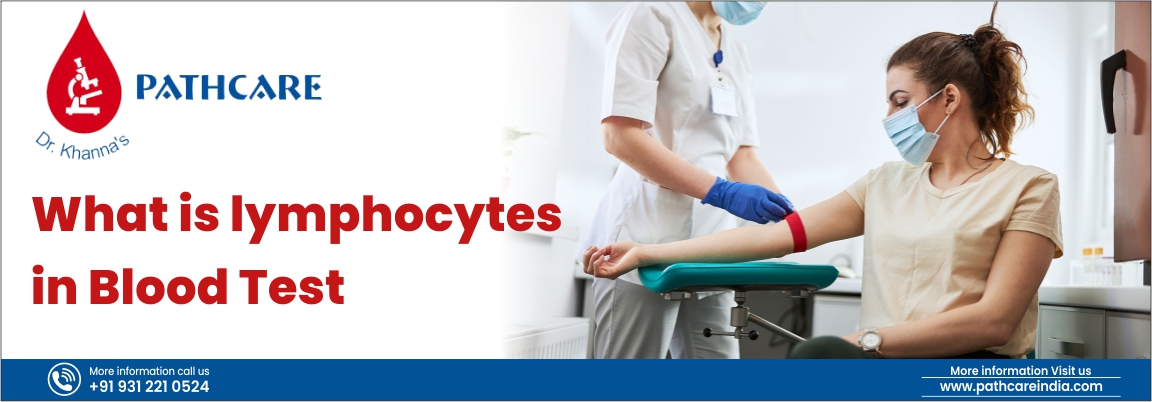No products in the cart.

The immune system is a complicated network of immune cells, which include lymphocytes. These cells collaborate to protect the body from outside substances that can disrupt its functioning, such as bacteria, viruses, and cancer cells. Lymphocytes are a sort of white blood cell that aids your immune system by assisting your body in fighting infection and sickness. Are you looking to book an absolute Lymphocyte Count blood test in Delhi, then read the following article and book your test today at Pathcare Labs, the most trusted name in diagnostics.
What Exactly Are Lymphocytes?
Lymphocytes are specialized white blood cells. They are essential components of your immune system that help your body fight sickness and infection. The immune system is an elaborate structure of immune cells, lymph tissue, lymph nodes, and lymphatic organs. Lymphocytes are an immunological cell type. Lymphocytes are classified into two types:
T lymphocytes (also known as T cells): T cells direct your immune system’s reaction and attack and eliminate infected and tumor cells.
B lymphocytes (B cells): B lymphocytes produce antibodies. Antibodies are proteins that destroy invading organisms such as viruses, bacteria, etc.
What exactly do lymphocytes do?
Lymphocytes assist your immune system in fighting cancer and invading viruses and bacteria (antigens). Lymphocytes assist your immune system in remembering every antigen with which it comes into contact. Following an encounter, certain lymphocytes transform into memory cells. When memory cells encounter an antigen again, they recognize it and respond swiftly. This is the reason why you don’t get measles or chickenpox more than once. It’s also why getting vaccinated can help avoid some diseases.
How do T and B cells function?
Your T cells and B cells collaborate. They each play a unique role in your immune system.
T cells aid in the death of infected cells and regulate your body’s immunological response to foreign substances. Most T cells require the assistance of another immune cell to get activated. When your T cells are activated, they grow and differentiate into various types of T cells. These are some examples:
Cytotoxic (killer) T cells: bind to antigens found on infected or defective cells. The contaminated cells are then killed by generating holes in their cell membranes and injecting enzymes into the cells.
Helper T cells: These cells aid other immune cells. Certain helper T cells assist B cells in making antibodies against invaders. Others help in the activation of cytotoxic T cells.
Regulatory (suppressor) T cells: These cells produce molecules that aid in terminating your immune system’s reaction to an attack. They can sometimes prevent detrimental responses from occurring.
Antigens bind to B cell receptors on their surfaces. B cells learn to recognize different antigens and make antibodies specific to each one. B cells get reactive toward antigens in two ways:
Primary immunological response: Your B cells are activated when an antigen binds to a receptor. Some B cells differentiate into memory cells. Other B cells differentiate into plasma cells. Plasma cells produce antibodies that are unique to the antigen that activated them. It can take many days to produce plenty of that specific antibody.
Secondary immune response: If your B cells come into contact with that antigen again, memory cells remember it and multiply. They transform into plasma cells and rapidly manufacture the appropriate antibodies.
Normal levels and ranges
No set number of lymphocyte cells is required to keep the body healthy. This is because lymphocyte levels might vary depending on a person’s race, gender, geography, and lifestyle behaviors.
However, maintaining healthy lymphocytes circulating throughout the body is critical for immune system function.
Some lymphocyte cells are in charge of fighting germs and viruses.
Other lymphocytes attack the body’s cells that are malfunctioning due to a virus or malignancy. A high number or too few lymphocytes can indicate illness.
In adults, the typical lymphocyte range is 1,000 to 4,800 lymphocytes per microliter (L) of blood. The usual range in children is between 3,000 to 9,500 lymphocytes in 1 L of blood.
What does a high level indicate?
Lymphocyte counts that are higher than usual can be a safe and transient illness caused by the body’s typical reaction to an infection or inflammatory illness.
A high level of lymphocytes can also imply lymphocytosis, which can be a sign of a more serious illness. An infection or disease most commonly causes lymphocytosis. Your body occasionally manufactures extra lymphocytes to aid in the battle against infections and diseases. Lymphocytosis is the term doctors use to describe lymphocyte counts of more than 4,000 per 1 L of blood in adults. This threshold, however, can change between labs and persons of different ages.
Symptoms of lymphocytosis vary depending on what causes the increase of lymphocytes. Among the various causes of lymphocytosis are:
Causes
- viral infections, such as HIV
- AIDS
- Blood cancers- leukemia, non-Hodgkin lymphoma
- mycobacterial tuberculosis
- Hepatitis
- Syphilis
- bacterial infections, such as Bartonella henselae
- parasitic infections, such as Toxoplasma
- Mononucleosis.
- Underactive thyroid (hypothyroidism).
- Infections such as whooping cough, or cytomegalovirus.
- drug reactions
- Stress
A doctor may do a number of blood test in Delhi to determine the underlying reason for lymphocytosis. They will investigate a person’s symptoms and past medical conditions. Additional diagnostic testing, such as blood tests or medical imaging scans, may be ordered by doctors to confirm the cause.
What does a low level indicate?
Lymphocyte counts that are below the normal range can potentially be transient.
Causes
Lymphocytopenia is the medical term for abnormally low lymphocyte counts. This is typically less than 1,000 lymphocytes in 1 L of blood in people. It could be caused by: the body not producing enough lymphocytes; a condition that destroys lymphocytes; or lymphocytes becoming stuck in the lymph nodes.
Lymphocytopenia can occur due to the following diseases or treatments:
- Infections – viral hepatitis
- HIV or AIDs.
- autoimmune diseases – lupus
- steroid therapy
- blood cancer- non-Hodgkin lymphoma
- Chemotherapy or radiation treatments
- Tuberculosis
- typhoid fever.
- Rare inherited disorders include severe combined immunodeficiency (SCID), ataxia-telangiectasia, DiGeorge syndrome, and Wiskott-Aldrich syndrome.
People can inherit lymphocytopenia in some situations. Wiskott-Aldrich syndrome, for example, is caused by genetic abnormalities that limit the body’s ability to create lymphocytes.
Common tests to check lymphocytes health
A few blood tests can tell you how many lymphocytes are in your blood. Among these tests are:
- Total lymphocyte count: A complete blood count (CBC) includes an absolute lymphocyte count. An absolute lymphocyte count reports the amount of cells as an absolute number rather than a percentage. To calculate your absolute lymphocyte count, multiply the total number of white blood cells by the percentage of white blood cells that are lymphocytes.
- Flow cytometry: Your blood is analyzed in a specialized laboratory using flow cytometry. A technician ceases your blood in a liquid and passes it through a flow cytometer, which is laser equipment. The laser’s light splits the blood cells into patterns allowing them to view and count the different cells.
Takeaway
Lymphocytes are specialized white blood cells. They are a component of your immune system, which assists your body in fighting sickness and infection. Your lymphocyte count can be measured during a routine blood test in Delhi at your doctor’s office. You could be concerned if your lymphocyte count is greater or lower than typical. A high or low score frequently indicates that your body has been assisting you in fighting an infection. If you are concerned, contact your doctor so that they can diagnose the underlying problem and schedule your Pathcare Labs tests.
Pathcare Labs is a state-of-art facility offering the highest quality diagnostic services with NABL accreditation. We pride ourselves on assured quality, offering the most affordable prices and quick yet reliable results.
Pathcare Labs believes in providing our consumers with the highest level of openness. Our entire staff is committed to providing the finest customer experience possible and constantly seeks new ways to meet our customers’ demands.
Frequently Asked Questions
How does a lymphocyte test work?
A lymphocyte blood test in Delhi is usually done by taking blood from a vein in your arm. After that, the blood sample is transported to a laboratory for analysis. The test determines the absolute count and percentage distribution of lymphocytes in the blood, which includes T cells, B cells, and natural killer (NK) cells.
What foods should you avoid if your white blood cell count is low?
If your white blood cell count is abnormally low due to a damaged immune system, avoid foods that may spread infections. This includes raw milk, raw milk yogurt or cheese, and unpasteurized juices.
What is the prevalence of lymphocytosis?
Lymphocytosis is fairly prevalent, especially in patients who have recently been infected. It is fairly uncommon for your body to experience a brief increase in lymphocytes after fighting off an infection, specifically a viral one.
What symptoms indicate lymphocytosis?
Lymphocytosis can result in lymphadenopathy (swollen lymph nodes) and splenomegaly (enlargement of the spleen). Splenomegaly can result in a dull ache on the upper right side of the body. Depending on the underlying cause, more symptoms may emerge.




